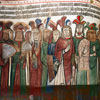Proof Of Reincarnation In Major Religions
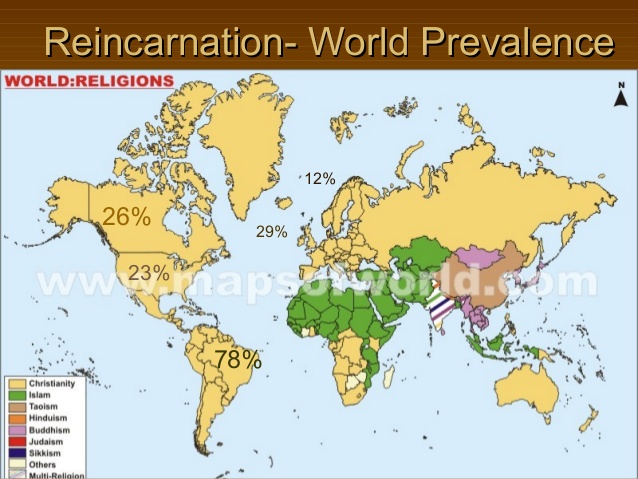 Reincarnation: A term applied to the understanding that beings, souls, or intelligences return or are reborn into a physical embodiment.
Reincarnation: A term applied to the understanding that beings, souls, or intelligences return or are reborn into a physical embodiment.
Throughout the history of countless civilizations world-wide dating far back as thousands of years, reincarnation has implied that living intelligent consciousness cannot persist in a physical state but must make temporary visits in cycles. Also called transmigration or metempsychosis by religions, theologians, and philosophers, an entity’s mind, soul, or consciousness not only persists after death but returns to physical life for purposes established by the particular belief.
Some traditional beliefs establish that reembodiment occurs in a variety of physical forms, though mostly human. These beliefs are not only held by Asian traditions but appear in established intellectual development of people throughout the world over the ages such as Africa, the Middle East, Europe, and the Americas. Thus, reincarnation is not a new idea but rather an understanding of life dating back to the beginnings of man.
Today, many religions hold a belief in reincarnation, especially Hinduism, Jainism, Buddhism,  and Sikhism, all of which arose in India. They all have in common a doctrine of karma (karman; “act”), the law of cause and effect, which states that what one does in this present life will have its effect in the next. In Hinduism the process of birth and rebirth—i.e., transmigration of souls—is endless until one achieves moksha, or liberation (literally “release”) from that process. Moksha is achieved when one realizes that the eternal core of the individual (atman) and the Absolute reality (brahman) are one. Thus, one can escape from the process of death and rebirth (samsara).
and Sikhism, all of which arose in India. They all have in common a doctrine of karma (karman; “act”), the law of cause and effect, which states that what one does in this present life will have its effect in the next. In Hinduism the process of birth and rebirth—i.e., transmigration of souls—is endless until one achieves moksha, or liberation (literally “release”) from that process. Moksha is achieved when one realizes that the eternal core of the individual (atman) and the Absolute reality (brahman) are one. Thus, one can escape from the process of death and rebirth (samsara).
LINKS TO PRESENT-DAY BELIEF IN REINCARNATION:
- AFRICA
- AMERICAS
- ARAB INFLUENCE
- ASIA
- ANCIENT GREEKS
- BIBLICAL AND CHURCH FOUNDER REFERENCES
- CHRISTIANITY
- EUROPEAN BELIEFS
- JUDAISM
- MIDDLE EAST
- REINCARNATION RESEARCH
REINCARNATION ERADICATED IN THE WESTERN WORLD AND AMERICAS:
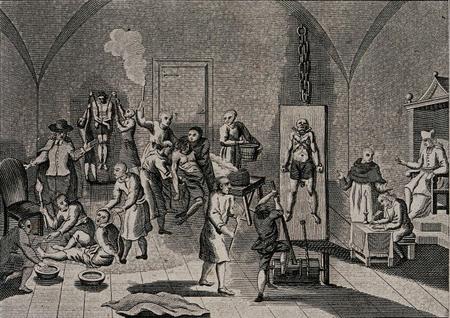 For the last two thousand years, Christianity set out to persecute and destroy much of the world’s belief in reincarnation. One fateful day, as the church grew in size and power, it seized control of humanity’s spiritual nature and the hunt for reincarnation began. Numerous church-friendly apologists upheld a disbelief in reincarnation, attacked church founders and original manuscripts, and endorsed the persecution of constituents, a process that started before Constantine’s time and led to the second council of Constantinople. Thousands, if not millions of people and documents were either banished, tortured, or killed in the name of the church, an effort still ongoing. Many church-forbidden writings and people survived, their history and concepts shown below.
For the last two thousand years, Christianity set out to persecute and destroy much of the world’s belief in reincarnation. One fateful day, as the church grew in size and power, it seized control of humanity’s spiritual nature and the hunt for reincarnation began. Numerous church-friendly apologists upheld a disbelief in reincarnation, attacked church founders and original manuscripts, and endorsed the persecution of constituents, a process that started before Constantine’s time and led to the second council of Constantinople. Thousands, if not millions of people and documents were either banished, tortured, or killed in the name of the church, an effort still ongoing. Many church-forbidden writings and people survived, their history and concepts shown below.
Around the 11–12th century, several reincarnationist movements were persecuted as heretics by the Holy Inquisition in the Latin west. These included the Cathar, Paterene or Albigensian church of western Europe, the Paulician movement, which arose in Armenia, and the Bogomils in Bulgaria. Persecution has not ceased but re-born in the form of salvation and doctrinal simplification, lower the bar on compliance while rejecting reincarnation evidence as acts of heresy.
In Greco-Roman thought, the concept of metempsychosis disappeared with the rise of Early Christianity, reincarnation being incompatible with the Christian core doctrine of salvation of the faithful after death. To said end, countless church founders and their works were either hidden, destroyed, or mistranslated to support the views of the newly proposed church whose new values were in opposition to the original biblical manuscripts and their analysis by said founders, many of who were direct descents and pupils of the original disciples themselves. See the link to CHRISTIANITY below for further details on efforts made, since 553 AD by Justinian and even before that, to cover up works of Origen and other founders. The empowerment of the church to control people’s devotional allegiance would only worsen with time, adding an entirely new dictionary of offenses considered punishable by death and the institution of a juridical body known as the Inquisition which is still alive today, rebranded as the Congregation for the Doctrine of the Faith.
Before the third century C.E., pagan and early Christian beliefs exist side by side in the Roman Empire. But when Constantine 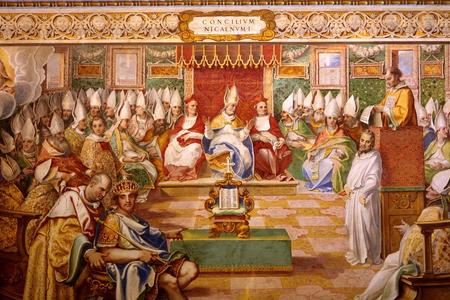 adopts Christianity as the religion of the state (Constantine only called himself Christian to earn support but continued being pagan), the Gnostics and the Mystery schools were persecuted and reincarnation seen as a heresy.
adopts Christianity as the religion of the state (Constantine only called himself Christian to earn support but continued being pagan), the Gnostics and the Mystery schools were persecuted and reincarnation seen as a heresy.
It is finally excised from Roman Church thinking in 553, when the teachings of Origen about the preexistence of the soul are anathematized by emperor Justinian. After this, it disappears from Church history for nearly a thousand years, briefly entering Europe as part of the teachings of the Cathars, the late Gnostic group that flourished in Northern Italy and Southern France in the 12th and 13th centuries.
Considered a threat to orthodoxy, the Cathars are brutally extirpated by the Church in the notorious Albigensian Crusade, which spawns the Inquisition (http://www.carolbowman.com/library/secret-history-reincarnation).
The fearful years of the 16th and 17th centuries, the Wars of Religion in Europe, force many of the Hermetic teachings underground once more. They are carefully disguised in the opaque symbolism of alchemy and in Rosicrucian allegories that only initiates can penetrate; one such initiate, who surely knows of reincarnation and a great deal more is Shakespeare (others are the painters Durer, Botticelli, and da Vinci, the poet Edward Spenser, and the English magus Dr. John Dee).
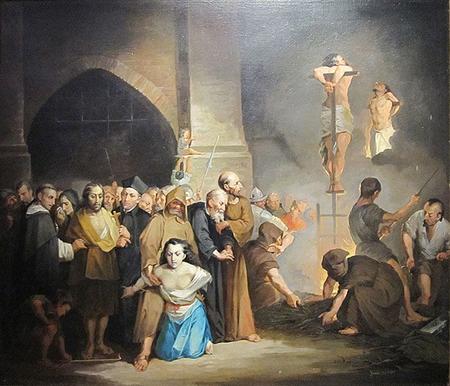 From the Renaissance on, with the rise of rationalism and early science, the psyche of the West begins to split. More and more, rationalist philosophers attack anything spiritual as superstition. In the 18th century, John Locke proclaims that the mind is a tabula rasa, a blank slate, at birth. Building on this dogma, the burgeoning ‘science’ of psychology will eventually decide to throw out any idea of psychic inheritance, inborn memories or traits, thus breaking with three thousand years of wisdom gleaned from the ancient philosophy of the soul. Perhaps it’s no coincidence that this doctrine appeared just as all of Europe and its land-grabbing settlers were trying to disown flagrant acts of colonial aggression, genocide, and the horrors of slavery. With events like these to remember, collective memory could prove embarrassing!
From the Renaissance on, with the rise of rationalism and early science, the psyche of the West begins to split. More and more, rationalist philosophers attack anything spiritual as superstition. In the 18th century, John Locke proclaims that the mind is a tabula rasa, a blank slate, at birth. Building on this dogma, the burgeoning ‘science’ of psychology will eventually decide to throw out any idea of psychic inheritance, inborn memories or traits, thus breaking with three thousand years of wisdom gleaned from the ancient philosophy of the soul. Perhaps it’s no coincidence that this doctrine appeared just as all of Europe and its land-grabbing settlers were trying to disown flagrant acts of colonial aggression, genocide, and the horrors of slavery. With events like these to remember, collective memory could prove embarrassing!
In Christianity’s path, we have the loss of countless civilizations, peoples, and ancient evidence whence reincarnation was born. Christianity was founded with a benign purpose, but as with all inventions of man of which religion is one, it fell into corrupt hands and history tells the story. Fifty million we are told was the European colonial death toll of those that inhabited American lands of old. In Europe, ancient Inquisition records still exist showing thousands of executions for reasons mostly fabricated by the church to intimidate and hold control. These records do not show unofficial executions and blood baths committed throughout Europe by Christian violence in the name of God.
ANCIENT TERMS REFERRING TO REINCARNATION:
Metempsychosis (μετεμψύχωσις), Greek philosophical term, refers to transmigration of the soul, especially its reincarnation after death [16]
Empsykhoun (to put a soul into, εμπψχωύν), term attributed to Pythagoras stating that the human soul does not die with the body but is born again in new incarnations [1]
Palingenesis (word reserved by Greeks to mean: being born again, reincarnation/regeneration, παλιγγενεσία) [17]:
- Meaning: restore a thing to its pristine state, renovation, renewal or restoration of life after death, Philo leg. ad Gaium § 41; de cherub. § 32
- This term can be traced back to the Greek Stoics who used the term for the continual re-creation of the universe by the Demiurgus (Creator) after its absorption into himself
- In the Gospel of Matthew 19: 28 (regeneration, Strong’s G3824), Jesus is quoted using this word to describe the Last Judgment foreshadowing the event of the regeneration of a new world. Palingenesiais thus as much the result of, or reason for, the Last Judgement as it is directly the Judgement itself. Similarly Philo spoke of Noah and his sons as leaders of a renovation or rebirth of the earth, Plutarch of the transmigration of souls, and Cicero of his own return from exile
- Found in Titus 3: 5, regeneration, Palingenesia
- Restoration of the Jewish nation after the exile, παλιγγενσια πατρίδος, Josephus, Antiquities 11, 3, 9
1. https://en.wikipedia.org/wiki/Reincarnation
2. https://www.britannica.com/topic/reincarnation
3. https://en.wikipedia.org/wiki/Kabbalah
4. H. Y. Ginsburgh, “Tav: Impression – The Seal of Creation,” [Online]. Available: www.inner.org/hebleter/tav.htm.
5. http://iisis.net
6. https://en.wikipedia.org/wiki/Gilgul
7. http://www.yeshshem.com/kabbalah-basic-class-11-reincarnation.htm
8. http://www.chabad.org/kabbalah/article_cdo/aid/380823/jewish/Reincarnation-and-Resurrection-43.htm
9. https://en.wikipedia.org/wiki/11Q13
10. https://www.near-death.com/reincarnation/history/judaism.html
11. https://www.huffingtonpost.com/rabbi-adam-jacobs/reincarnation-in-judaism_b_811379.html
12. Sefer HaGilgulim, “The Book of Reincarnations,” by Chaim Vital
13. http://nazarenespace.com/group/essenenezarenes/forum/topics/the-crucifixion-of-jesus-by-an-eye-witness
14. https://en.wikipedia.org/wiki/Druid
15. https://en.wikipedia.org/wiki/Orphism_(religion)
16. https://en.wikipedia.org/wiki/Metempsychosis
17. https://en.wikipedia.org/wiki/Palingenesis
18. http://www.essene.org/Ancient_Essenes.htm
19. http://www.faculty.umb.edu/gary_zabel/Courses/Phil%20281b/Philosophy%20of%20Magic/Arcana/Kabbalah/souls.html
20. https://en.wikipedia.org/wiki/Yiddish_literature
21. https://en.wikipedia.org/wiki/Rebirth_in_North_Germanic_religion
22. http://nativeamericannetroots.net/diary/1148
23. http://www.rosicrucian-order.com/revista_reenc.htm
24. https://en.wikipedia.org/wiki/Talk:Rosicrucianism
25. “Afterlife! A religious, philosophy, psychological perspective,” Henry Epps. CreateSpace Independent Publishing Platform (July 17 2012)
26. https://en.wikipedia.org/wiki/Alawites
27. http://progressive-muslim.org/islam-and-reincarnation.htm
28. https://en.wikipedia.org/wiki/Hermetica
For more discussion and videos please see here.
Posted in Other Topics, Reincarnation, True History of Manwith comments disabled.

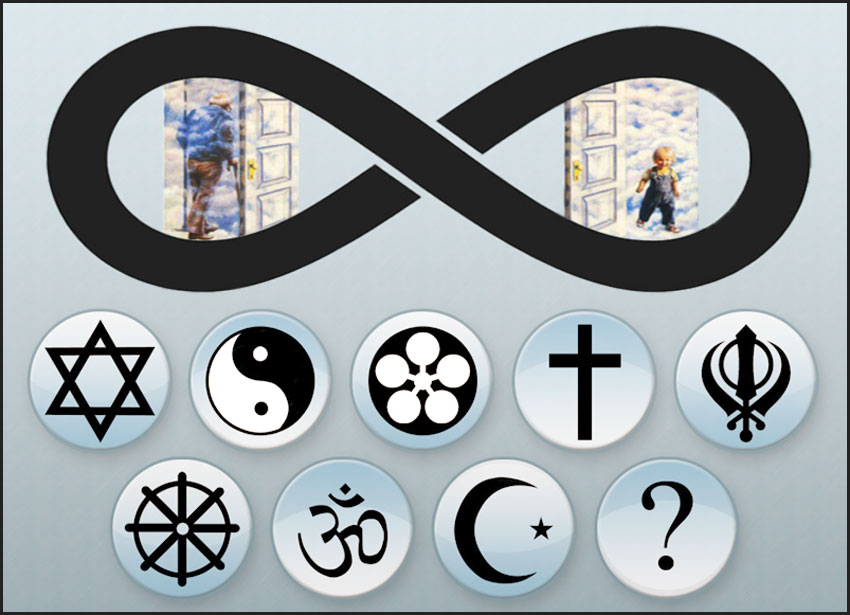 by
by 
